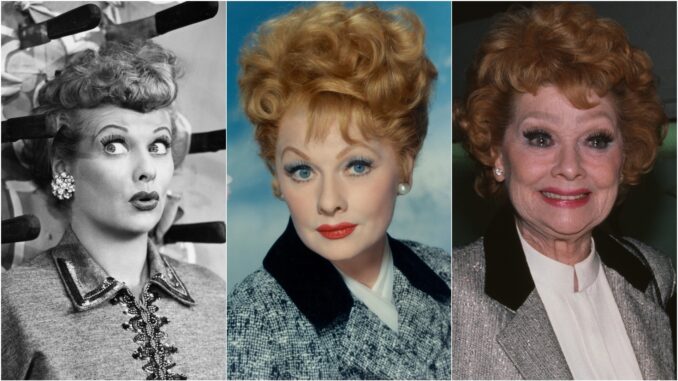
When we think about Lucille Ball, iconic images of I Love Lucy immediately spring to mind. A pioneer of television comedy, her legacy is etched into the very fabric of the sitcom genre. But here’s a twist: Lucille Ball was not just a legend of her own era—she was also a passionate fan of Three’s Company, the cheeky, laugh-out-loud sitcom that defined the late 70s and early 80s.
This might surprise some fans, given the generational gap and different comedic styles. Yet, Lucille’s admiration for Three’s Company reveals a deeper connection between television greats across decades and highlights how even the biggest stars find joy and inspiration in shows outside their own spotlight.
Let’s uncover how Lucille Ball became a devoted fan of Three’s Company, what drew her in, and what that tells us about the timeless appeal of great sitcoms.
The Legacy of Lucille Ball: TV’s Comedy Queen
A Brief Look at Lucille Ball’s Career
Lucille Ball wasn’t just an actress; she was a trailblazer who shaped TV comedy. From I Love Lucy to pioneering production roles, she changed the game.
Her Influence on Sitcoms and Comedy
Her work set a high bar for humor, timing, and character-driven storytelling that inspired future generations of comedians and producers.
What is ‘Three’s Company’? A Sitcom Phenomenon
The Premise and Popularity of the Show
Three’s Company revolved around three roommates navigating misunderstandings, gender roles, and hilarious misadventures, capturing America’s heart.
Why ‘Three’s Company’ Was Unique for Its Time
It balanced risqué humor with genuine warmth, making it both daring and accessible to audiences.
Lucille Ball’s Unexpected Admiration
How Word Got Out About Her Fandom
Stories and interviews revealed that Lucille was a big fan, often praising the show’s writing and performances.
What Specifically Drew Her to ‘Three’s Company’?
Lucille admired the comedic timing, physical humor, and the chemistry between the actors.
The Common Thread: Physical Comedy and Timing

Why Physical Comedy Transcends Generations
Both I Love Lucy and Three’s Company relied heavily on physical gags, a universal form of humor that anyone can appreciate.
Lucille’s Appreciation for Skillful Comedy
She respected actors who could deliver both slapstick and sharp dialogue effortlessly.
Behind the Scenes: Lucille Ball’s Connection to Sitcom Stars
Did She Ever Meet the ‘Three’s Company’ Cast?
There were anecdotes about Lucille expressing interest in meeting the cast, showing genuine affection.
The Mutual Respect Among TV Legends
This admiration highlights how TV icons support and uplift each other across eras.
The Role of ‘Three’s Company’ in Shaping Modern Comedy
Influence on Future Sitcoms
The show’s blend of farce and character-driven humor paved the way for many 80s and 90s sitcoms.
Why Lucille Ball Saw It as a Successor to Her Legacy
She recognized the importance of evolving comedy while keeping core elements intact.
How Lucille Ball’s Fandom Changed Perceptions
Bridging Generations Through Shared Humor
Her support showed that great comedy isn’t limited by time—it’s universal.
Inspiring Fans of All Ages
Lucille’s fandom encouraged older viewers to embrace newer shows, creating a shared cultural conversation.
What the Cast of ‘Three’s Company’ Thought About Lucille Ball
Fan Letters and Praises
Some cast members expressed their excitement knowing Lucille admired their work.
The Impact of Her Praise on Their Careers
Her endorsement added prestige and encouragement.
The Evolution of Sitcom Humor: From Lucille to ‘Three’s Company’
Changes in Themes and Boundaries
From the wholesome antics of I Love Lucy to the risqué humor of Three’s Company, TV comedy evolved with society.
Continuity in Quality and Audience Engagement
Despite changes, both shows shared a commitment to making audiences laugh and feel connected.
Why ‘Three’s Company’ Resonates With Audiences Today
Timeless Humor and Relatable Situations
Even decades later, the show’s humor feels fresh and its scenarios relatable.
Lucille Ball’s Enduring Influence Seen in Modern Comedy
Her style continues to inspire comedic actors and writers who work on shows like Three’s Company.
Lucille Ball’s Legacy Lives On Through New Generations
From Classic TV to Streaming Platforms
Both I Love Lucy and Three’s Company continue to find new fans through modern viewing options.
The Power of Iconic TV Moments
Lucille’s fandom reminds us why these shows remain beloved cultural touchstones.
Lessons From Lucille Ball’s Superfan Moment
The Value of Supporting Fellow Artists
Lucille’s admiration underscores the importance of uplifting peers.
How Passion for Comedy Transcends Age and Era
Humor unites, regardless of when or where it’s created.
How Lucille Ball’s Support Inspires Current Actors and Fans
A Model for Humility and Appreciation
Her fandom teaches humility, even for the biggest stars.
Encouraging a Culture of Mutual Respect
Her example invites everyone to celebrate others’ successes.
Conclusion
Lucille Ball’s love for Three’s Company isn’t just a fun trivia fact—it’s a powerful reminder of how comedy connects people across generations. Her fandom shines a light on the timelessness of great humor and the enduring legacy of television legends. By embracing and celebrating the next wave of sitcom stars, Lucille showed us that admiration knows no bounds, and that every era of comedy has its place in our hearts.
